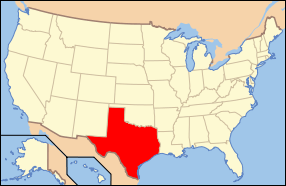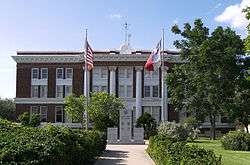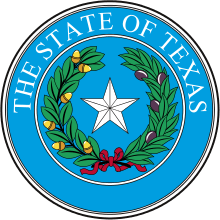Willacy County, Texas
| Willacy County, Texas | |
|---|---|
| County | |
| Willacy County | |
|
The Willacy County Courthouse in Raymondville | |
 Location in the U.S. state of Texas | |
 Texas's location in the U.S. | |
| Founded | 1912 |
| Named for | John G. Willacy |
| Seat | Raymondville |
| Largest city | Raymondville |
| Area | |
| • Total | 784 sq mi (2,031 km2) |
| • Land | 591 sq mi (1,531 km2) |
| • Water | 194 sq mi (502 km2), 25% |
| Population | |
| • (2010) | 22,134 |
| • Density | 37/sq mi (14/km²) |
| Congressional district | 34th |
| Time zone | Central: UTC-6/-5 |
| Website |
www |
Willacy County is a county located in the U.S. state of Texas. As of the 2010 census, its population was 22,134.[1] Its county seat is Raymondville.[2] The county was created in 1911 and organized the next year.[3]
Willacy County comprises the Raymondville, TX Micropolitan Statistical Area, which is included in the Brownsville–Harlingen–Raymondville, TX Combined Statistical Area.
History
Willacy County was formed in 1911 from parts of Cameron and Hidalgo counties and originally included what is now Kenedy County; it was named for state senator John G. Willacy. Kenedy was split from Willacy in 1921, when the long-settled ranchers of the northern (Kenedy) part of the county sought to separate from the newly arrived farmers of the southern part.
The Bermuda onion was introduced to Willacy County in 1912. It grew well and slowly displaced ranchland in the southern part of the county, becoming the most important crop. For many years the town of Raymondville held an annual Onion Festival, using the tag line, "The Breath of a Nation." In 1940, the first oil wells were sunk in the county's Willamar Oil Field; today oil production is a major part of the local economy, although increasingly eclipsed by natural gas. Also in the 1940s, sorghum was introduced to the county, gradually displacing cotton and other crops. Cattle ranching remains a substantial economic activity as well.
Geography
According to the U.S. Census Bureau, the county has a total area of 784 square miles (2,030 km2), of which 591 square miles (1,530 km2) is land and 194 square miles (500 km2) (25%) is water.[4] It borders the Gulf of Mexico.
Major highways
 Interstate 69E (Under Construction)
Interstate 69E (Under Construction) U.S. Highway 77
U.S. Highway 77 State Highway 186
State Highway 186 Farm to Market Road 498
Farm to Market Road 498
Adjacent counties
- Kenedy County (north)
- Cameron County (south)
- Hidalgo County (west)
National protected areas
Demographics
| Historical population | |||
|---|---|---|---|
| Census | Pop. | %± | |
| 1930 | 10,499 | — | |
| 1940 | 13,230 | 26.0% | |
| 1950 | 20,920 | 58.1% | |
| 1960 | 20,084 | −4.0% | |
| 1970 | 15,570 | −22.5% | |
| 1980 | 17,495 | 12.4% | |
| 1990 | 17,705 | 1.2% | |
| 2000 | 20,082 | 13.4% | |
| 2010 | 22,134 | 10.2% | |
| Est. 2015 | 21,903 | [5] | −1.0% |
| U.S. Decennial Census[6] 1850–2010[7] 2010–2014[1] | |||
As of the 2010 United States Census, there were 22,134 people residing in the county. 85.8% were White, 2.1% Black or African American, 0.6% Asian, 0.3% Native American, 9.3% of some other race and 1.8% of two or more races. 87.2% were Hispanic or Latino (of any race).
As of the census[8] of 2000, there were 20,082 people, 5,584 households, and 4,584 families residing in the county. The population density was 34 people per square mile (13/km²). There were 6,727 housing units at an average density of 11 per square mile (4/km²). The racial makeup of the county was 7% White, 2.19% Black or African American, 0.50% Native American, 0.11% Asian, 0.03% Pacific Islander, 24.46% from other races, and 2.34% from two or more races. 85.69% of the population were Hispanic or Latino of any race.
There were 5,584 households out of which 42.90% had children under the age of 18 living with them, 62.10% were married couples living together, 16.10% had a female householder with no husband present, and 17.90% were non-families. 16.50% of all households were made up of individuals and 9.70% had someone living alone who was 65 years of age or older. The average household size was 3.40 and the average family size was 3.85.
In the county, the population was spread out with 31.60% under the age of 18, 11.90% from 18 to 24, 26.60% from 25 to 44, 18.30% from 45 to 64, and 11.60% who were 65 years of age or older. The median age was 30 years. For every 100 females there were 105.20 males. For every 100 females age 18 and over, there were 104.90 males.
The median income for a household in the county was $22,114, and the median income for a family was $25,076. Males had a median income of $19,706 versus $15,514 for females. The per capita income for the county was $9,421. About 29.20% of families and 33.20% of the population were below the poverty line, including 42.00% of those under age 18 and 29.90% of those age 65 or over. The county's per-capita income makes it the fifth poorest county in the United States.[9]
Education
School districts that serve Willacy County include:
- Lasara Independent School District (K-8)
- Lyford Consolidated Independent School District
- Raymondville Independent School District
- San Perlita Independent School District
In addition, residents are allowed to apply for magnet schools operated by the South Texas Independent School District.
Media
- KFRQ 94.5FM - Official Site
- KKPS 99.5FM - Official Site
- KNVO 101.1FM - Official Site
- KVLY 107.9FM - Official Site
Prisons
Raymondville is the location of three private prisons, all adjacent to each other:[10]
- the Willacy County Correctional Center (closed 2015)
- the Willacy County Regional Detention Center
- and Willacy County State Jail
Recent controversy
The elected officials of the tiny county, recently, have been entangled in a series of political controversies. Amongst other things, the District Attorney has sought the removal of the local sheriff, county clerk, and district clerk. Meanwhile, the Sheriff and the two clerks have petitioned the district court for the removal of the District Attorney. More recently, the District Attorney has gained even more attention for his actions concerning the dismissal of a Capital Murder charge against a confessed assailant because of, he claimed, an appropriate time to prepare. However, he found time to file, the very next day, a petition for the removal of the County Judge.
On November 18, 2008 a Willacy County grand jury indicted a number of political figures, including Vice President Dick Cheney and former Attorney General Alberto Gonzales.
Indictments have not yet been made public and a district judge still has to sign the indictments. Two state district judges were also indicted along with State Senator Eddie Lucio, Jr.[11]
Historic sites
Willacy County has an entry on the National Register of Historic Places:
Communities
Cities
- Lyford
- Raymondville (county seat)
- San Perlita
Census-designated places
Unincorporated community
References
- 1 2 "State & County QuickFacts". United States Census Bureau. Retrieved December 29, 2013.
- ↑ "Find a County". National Association of Counties. Retrieved 2011-06-07.
- ↑ "Texas: Individual County Chronologies". Texas Atlas of Historical County Boundaries. The Newberry Library. 2008. Retrieved May 27, 2015.
- ↑ "2010 Census Gazetteer Files". United States Census Bureau. August 22, 2012. Retrieved May 12, 2015.
- ↑ "County Totals Dataset: Population, Population Change and Estimated Components of Population Change: April 1, 2010 to July 1, 2015". Retrieved July 2, 2016.
- ↑ "U.S. Decennial Census". United States Census Bureau. Retrieved May 12, 2015.
- ↑ "Texas Almanac: Population History of Counties from 1850–2010" (PDF). Texas Almanac. Retrieved May 12, 2015.
- ↑ "American FactFinder". United States Census Bureau. Retrieved 2011-05-14.
- ↑ United States counties by per capita income
- ↑ Tyx, Daniel Blue (26 March 2015). "Goodbye to Tent City". Texas Observer. Retrieved 30 July 2016.
- ↑ Sherman, Christopher. :State senator wants broad indictments dismissed," The Houston Chronicle. Nov 19, 2008.
External links
- Willacy County from the Handbook of Texas Online.
- Historic Willacy County materials, hosted by the Portal to Texas History.
- Willacy County Profile from the Texas Association of Counties
 |
Kenedy County |  | ||
| Hidalgo County | |
Gulf of Mexico | ||
| ||||
| | ||||
| Cameron County |
Coordinates: 26°29′N 97°36′W / 26.49°N 97.60°W

